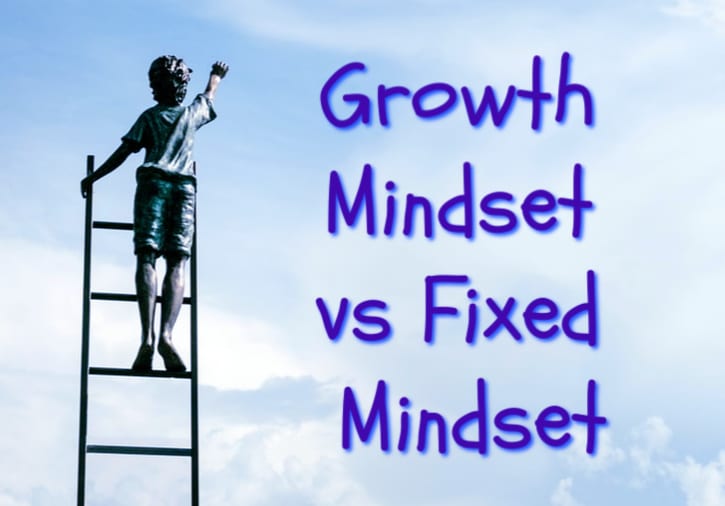Katie* had just two hours before she had to turn in her final project for her theater props class. She had not been successful in any of her previous attempts to build a prop. With just two hours to go, she started completely over, using a different approach she had researched, and finished just in time to take her creation to class. She got an A on the project.
Barry* was home sick from school but had a group presentation due in English class that day. He felt well enough to facetime his teacher and do his part of the presentation from home. His group got an A on the presentation.
What made these two teens overcome the challenges they faced and persevere to get their projects accomplished instead of giving up?
According to Stanford psychologist, Carol Dweck, there are two types of mindsets: a fixed mindset and a growth mindset. These two mindsets profoundly affect the way you lead your life. They can determine whether you become the person you want to be and whether you accomplish the things you value. How can a simple belief have the power to alter your psychology and your life?
In a fixed mindset, people see their qualities as fixed traits that cannot be changed. They believe intelligence, abilities, and talents are all fixed qualities that they are born with rather than a quality that they can improve on. They also believe that talent alone leads to success, and effort is not required. People with a fixed mindset create an urgency to prove themselves over and over. Every situation calls for a confirmation of their intelligence, personality, or character. Every situation is analyzed: Will I succeed or fail? Will I look smart or dumb? Will I be accepted or rejected?
Conversely, in a growth mindset, people believe that their learning and intelligence can grow with time and experience. They view effort as the number one influence of changing their intelligence and talents so they put in extra time, leading to higher achievement. Their basic abilities are simply a starting point for their potential. At the heart of what makes the “growth mindset” so winsome is that it creates a passion for learning rather than a hunger for approval. They don’t actually see themselves as failing in a situation — they see themselves as learning.
Why is mindset important in developing positive habits?
Your beliefs about yourself can hold you back from making positive changes if your mindset is fixed. If you have a trait that you believe cannot be changed, such as your intelligence, weight, or bad habits, you will avoid situations that could possibly be uncomfortable or that you think are useless. Barry could have used a fixed mindset to tell himself there was nothing he could do to be a part of the group presentation because he was sick. He cannot change being sick. Instead, he used a growth mindset to come up with an alternate way to still give his presentation.
How to develop a growth mindset:
- View challenges as opportunities.
When you take on new challenges, you develop as a person, especially if you think of a challenge as an opportunity to learn about yourself. People with a fixed mindset tend to avoid embarking on a new challenge because of the risk of failure. This results in remaining in your comfort zones where you will not learn and grow. - Utilize the right learning style.
There is no one size fits all for learning. Growth mindset people blend various learning styles with their own bits of intelligence into learning approaches that are most effective for them. - Your brain is growth mindset ready.
Your brain forms new connections throughout life that allow it to make adjustments and be retrained in new situations. Your brain is constantly changing, which allows you to adopt a growth mindset. Remember that if the brain is not fixed, then the mind should not be fixed either. - Focus on the journey instead of the end result.
People who have a growth mindset often have a willingness to learn. They understand that any growth is going to be a process and enjoy the progression, setting their own goals to get the most out of it. They also are open to the process continuing beyond the expected time frame. One of the most important things about the journey of learning is the unexpected lessons that you may pick up along the way. Choose learning well over learning fast. You can’t rush learning. You have to go through some mistakes in order to truly find success, and none of that will come easy or quickly. - Reward effort and actions, not traits.
Exclaiming, “You are so smart!” when your child does well on a test is nice to hear but it doesn’t focus on other areas that made have led up to the good grade. Your child may have studied for a longer period of time or found a new way to study for the test. It’s good to tell others that their action is important rather than just telling them that they are smart in general. This helps people strive to continue to focus on the journey and not just the end goal. Here is a list of encouraging words to say to your children. - Learn to give and receive constructive criticism.
It’s hard to take criticism from someone but think of criticism as a way to learn and grow. If you have an area of weakness, be thankful that someone pointed it out to you so you are aware and can focus on improvement. Try not to take constructive criticism personally. Most of the time, criticism is given to help you, not cut you down. - Improvement does not mean failure.
Just because you need to improve in one area does not mean you have failed. It means that you are on the right track, you’re just not quite there yet. - Cultivate determination.
Having a deep interest or passion in your work is one of the most important things to keep you motivated each day and to keep you wanting to be successful in your field. In order to accomplish your long-term goals, you have to have the perseverance to keep you motivated and on track. - Never stop learning.
You will never be completely finished learning. Just because you have finished one class or one project does not mean that you should be done learning. Growth-minded people are able to continue to generate new goals so they stay driven and inspired in the subjects that they choose to study. - It takes time to learn.
Nothing worth doing comes quickly and easily. You have to be realistic about the time it will take for you to learn the information that you are interested in to the point of your satisfaction. It may take several different learning styles or several times of applying a new technique until it really sticks and you are able to master it. Additionally, because things are constantly changing, this means that the learning process may never truly be over.
Are you ready to grow?
In order to develop a growth mindset, you have to be willing and committed to changing your beliefs about what you are able to do. You also have to take the appropriate actions to learn and stay motivated by looking at the big picture of why it will benefit you in the long run. By figuring out the best ways that you learn, you can combine these learning tactics to provide yourself with the most effective lessons that will help you achieve more success throughout your life.
To see what type of mindset you currently have, try this Growth mindset quiz here.


Recent Comments